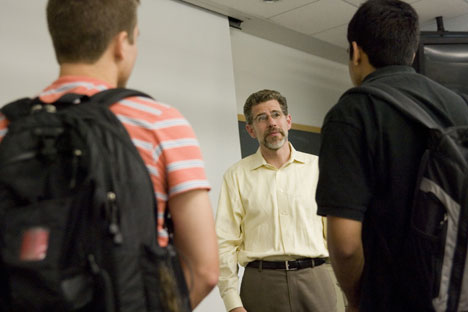Meet the New Faculty: Richard Newell
Mapping out approaches to ending global warming

Richard Newell, a specialist in the economics of climate change, energy technologies and market-based environmental policy, is applying his expertise to one of the most challenging problems ever to confront humankind.
As Duke's new Gendell Associate Professor of Energy and Environmental Economics at the Nicholas School of the Environment and Earth Sciences, Newell is evaluating the effectiveness and costs of different approaches for societies and nations to deal with global warming.
And, in his first university job after years as a Washington D.C. researcher and adviser, he is also passing on his knowledge to the very generation that will be at the front lines of needed action.
In an interview in his Old Chemistry office, Newell says he is an optimist. "It's important to remain an optimist about dealing with greenhouse gasses, because the more you learn about the problem the more you learn about how daunting it is," he says.
"There's a reason why we haven't reduced our greenhouse gas emissions to zero already, or significantly reduced them. It's because energy pervades every part of our economy. And the vast majority of that energy comes from fossil fuels that emit greenhouse gasses."
On campus since June, he is now evaluating how research, development and the training of specialists need to converge to affect needed technological changes, as well as assessing how utilities and consumers can work together to reduce demand for energy.
He is also participating in a Duke collaboration targeting methods to pipe off and sequester the greenhouse gas of current interest -- carbon dioxide -- from power plant sites where much of it is produced. And in his first teaching course, which he calls "exciting," he is introducing mostly master's degree students to the interplay of energy needs, environmental limits and the marketplace where he thinks solutions must unfold.
With bachelor's degrees in philosophy and materials engineering and a master's degree in public policy, Newell can view these issues from multiple perspectives. After two subsequent years working in Washington, D.C., consulting for the U.S. Environmental Protection Agency, he earned a Ph. D. in environmental and resource economics in 1997 from Harvard, where he evaluated how energy prices and government regulations affect products' energy efficiencies.
He spent a decade at Resources for the Future, a nonprofit, non-partisan research institution in Washington, D.C., where he studied how government agencies and private companies could cooperate in reducing greenhouse gasses.
One much discussed option is "cap-and-trade." which sets a ceiling on emissions and requires emitters exceeding their limits to pay for emission allowances from others that are below their own limits. "The most cost-effective way to respond is to provide a direct financial incentive to reduce emissions," he says.
In 2005, Newell spent a year on leave from Resources for the Future to serve on the Council of Economic Advisers. As senior economist for energy and the environment, his role was to provide the White House with independent economic advice on various policy issues. A colleague there was Ben Bernanke, who went on to become the new Federal Reserve Board chairman.
While at the council, he was approached about a new professor position at the Nicholas School. "Initially, I was so overwhelmed with work that I couldn't imagine considering it," he says. "But then, when I found that the job description was such an exact match with my interests I decided to apply."
When not teaching and researching, Newell now enjoys tramping around the woodsy environment surrounding his Chapel Hill home, as well as spending time with his two young daughters. His wife, Bonnie Nevel, is herself a freelance consultant on environmental issues, mainly working with the World Bank.